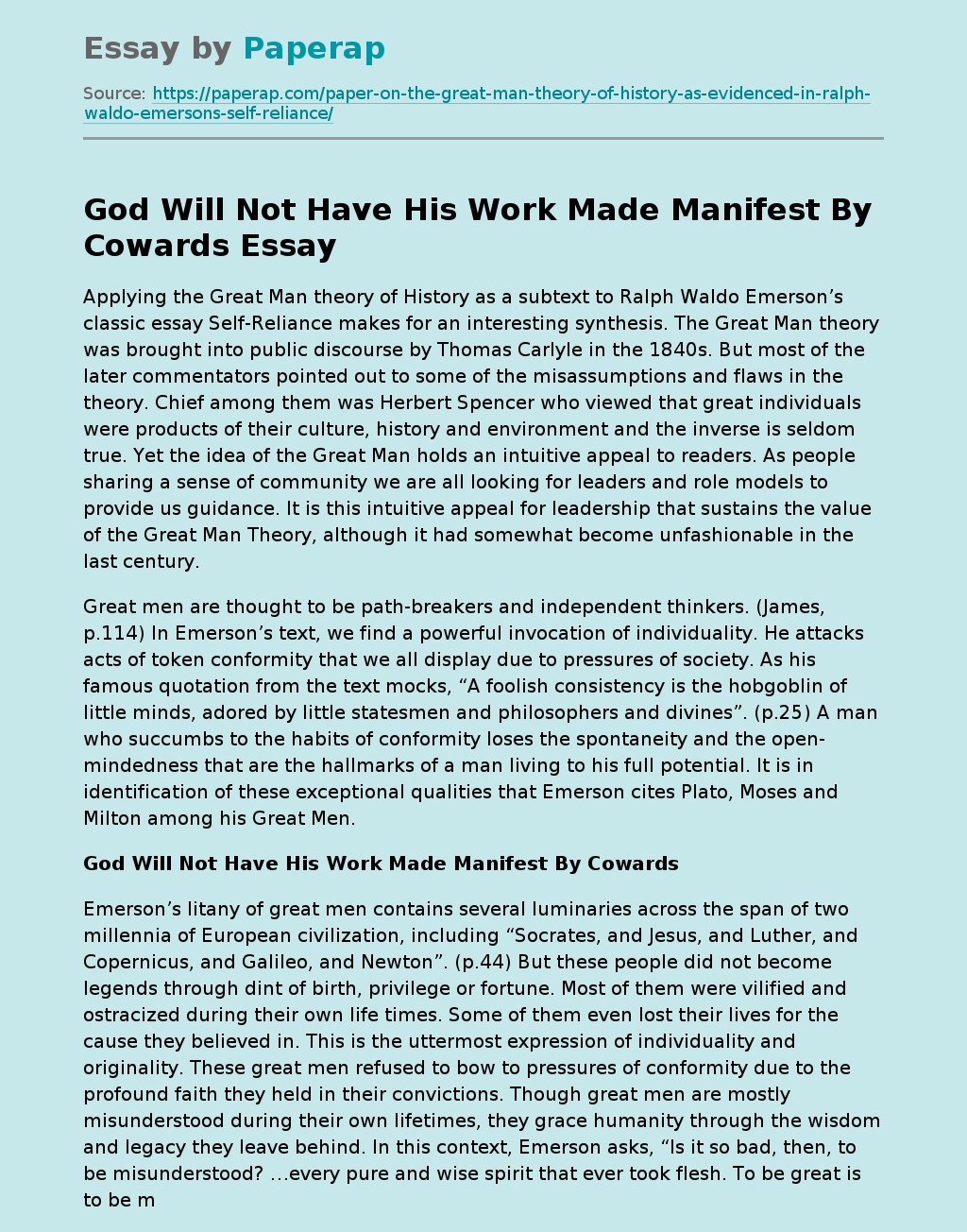God Will Not Have His Work Made Manifest By Cowards
Applying the Great Man theory of History as a subtext to Ralph Waldo Emerson’s classic essay Self-Reliance makes for an interesting synthesis. The Great Man theory was brought into public discourse by Thomas Carlyle in the 1840s. But most of the later commentators pointed out to some of the misassumptions and flaws in the theory. Chief among them was Herbert Spencer who viewed that great individuals were products of their culture, history and environment and the inverse is seldom true.
Yet the idea of the Great Man holds an intuitive appeal to readers. As people sharing a sense of community we are all looking for leaders and role models to provide us guidance. It is this intuitive appeal for leadership that sustains the value of the Great Man Theory, although it had somewhat become unfashionable in the last century.
Great men are thought to be path-breakers and independent thinkers. (James, p.114) In Emerson’s text, we find a powerful invocation of individuality.
He attacks acts of token conformity that we all display due to pressures of society. As his famous quotation from the text mocks, “A foolish consistency is the hobgoblin of little minds, adored by little statesmen and philosophers and divines”. (p.25) A man who succumbs to the habits of conformity loses the spontaneity and the open-mindedness that are the hallmarks of a man living to his full potential. It is in identification of these exceptional qualities that Emerson cites Plato, Moses and Milton among his Great Men.
God Will Not Have His Work Made Manifest By Cowards
Emerson’s litany of great men contains several luminaries across the span of two millennia of European civilization, including “Socrates, and Jesus, and Luther, and Copernicus, and Galileo, and Newton”.
(p.44) But these people did not become legends through dint of birth, privilege or fortune. Most of them were vilified and ostracized during their own life times. Some of them even lost their lives for the cause they believed in. This is the uttermost expression of individuality and originality. These great men refused to bow to pressures of conformity due to the profound faith they held in their convictions. Though great men are mostly misunderstood during their own lifetimes, they grace humanity through the wisdom and legacy they leave behind. In this context, Emerson asks, “Is it so bad, then, to be misunderstood? …every pure and wise spirit that ever took flesh. To be great is to be misunderstood.”(p.32)
At the center of Emerson’s thesis are three ideas: distrust of social norms, recognition of genius in oneself, and the value of self-worth. These are also the virtues of Great Men as indicated in the theory. (Frinin, p.96) For example, great individuals that shaped the course of civilization were men of strong motivation, exemplary vision and self-belief. Of these characteristics, it is self-belief that enables and supports the other two. Since self-belief springs from individuality, Emerson’s assertion that “envy is ignorance, imitation is suicide“ is particularly prescient. When we analyze the lives of great men of history, we see how this attitude was manifest in all key moments in their lives. Whether we take rulers like Napoleon Bonaparte or Queen Elizabeth, or we consider the lives of scientists, philosophers and intellectuals, they are all united in belief in their convictions. Speaking for himself, Emerson writes, “My life is not an apology, but a life. It is for itself and not for a spectacle. I much prefer that it should be of a lower strain, so it be genuine and equal, than that it should be glittering and unsteady.” (p.26)
Courage is another virtue of the great men of history according to the theory. (Frinin, p.96) Congruent with this, Emerson’s text alludes to the centrality of this virtue for living a great life. In a strong endorsement for practicing valor in our everyday lives, Emerson writes “the sinew and heart of man seem to be drawn out, and we are become timorous desponding whimperers. We are afraid of truth, afraid of fortune, afraid of death, and afraid of each other.” (p.45) If courage is the state of not being afraid, it naturally follows that we express our thoughts in a honest manner. When it comes to self-expression, Emerson condemns half-measures or half-truths. He says, “We but half express ourselves, and are ashamed of that divine idea which each of us represents…but God will not have his work made manifest by cowards.” (p.11) Hence, while being courageous in our dealings with society is rewarding, the failure to upkeep it will not even bring us forgiveness from God. Emerson thus swiftly links human action and divine sanction.
Works Cited:
Ralph Waldo Emerson, Self-Reliance, A Classic Essay by Emerson. Excerpted from Essays, First Series. Published August 1st 2007 by Arc Manor.
James, W. 2005 [1880]. Great Men and Their Environment. Kila, MT: Kessinger Publishing
Grinin, Leonid 2010. The Role of an Individual in History: A Reconsideration. Social Evolution & History, Vol. 9 No. 2 (pp. 95–136).
God Will Not Have His Work Made Manifest By Cowards. (2019, Dec 05). Retrieved from https://paperap.com/paper-on-the-great-man-theory-of-history-as-evidenced-in-ralph-waldo-emersons-self-reliance/

